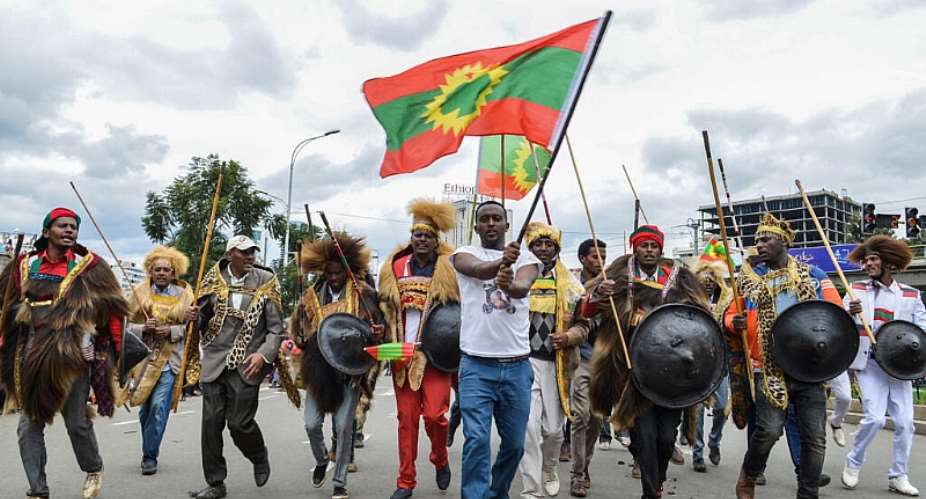In Ethiopia, the killing of a senior politician from the Oromo Liberation Front has already led to protests and is likely to aggravate tensions in Oromia, the country's largest and most populous region. At the same time, all parties agree that his death is a great loss for Ethiopia.
Bate Urgessa was shot at point-blank range and his body was found the next day on the side of a road outside the town of Meki, south of Addis Ababa.
“They could not break him, so they killed him,” French journalist Antoine Galindo told RFI on the day of Bate's funeral, in his hometown of Meki.
“Bate was picked up late on Tuesday 9 April and he was found dead on Wednesday 10 April, on a road outside Meki, his hands tied behind his back, face down, shot point blank in the head,” said Galindo, the East Africa editor for Africa Intelligence magazine.
Forty-one-year-old Battee Urgeessaa – the Oromo spelling of his name – was jailed and assaulted on numerous occasions because of his vocal defence of the rights of Oromo people.
Galindo, who was arrested himself in February on charges of “conspiracy to create chaos”, spent eight days with the Oromo politician in a crowded cell of 30 people in a city police department in the capital.
'Fearless'
Bate was a veteran member of the Oromo Liberation Front (OLF), fighting for the Oromo's rights to self-determination and to establish an independent state of Oromia.
A widely respected political figure, he was said to be a highly educated, peaceful man, who chose not to take arms to fight the federal government even after the 2018 failed peace agreement between the OLF and the Ethiopian Federal Government.
“He firmly believed in one thing: the power of the mind over that of the gun,” said Galindo, who shared the “same mattress, same blanket, same food, same clothes” as Bate in prison.
“He was fearless and unbroken despite countless arrests, attacks on his person and nearly dying in prison in 2022 because he did not receive medical treatment,” the journalist said.
“They did everything they could, over the years, to break this man and they never managed to.”
Galindo recalls their first encounter on a sunny terrace at a hotel in Addis on 22 February, where they met for a conversation on background.
“I asked him if he was aware of the risks to be seen talking to a foreign journalist. He replied that I shouldn't worry about that.”
They were arrested together later the same day, charged with “conspiracy to create chaos in Ethiopia” and “working to incite unrest”.
Snowball effect
The OLF says its struggle is about inclusion and redress for historical injustices.
“The Oromo people are far from having their grievances addressed,” according to Galindo.
“Their anger, whether at home or in the diaspora, is not going to fade away. Of course there is a risk of protests – this man has done nothing wrong, and he has been gunned down, his body thrown in a ditch.”
He added that large parts of the Oromia region have been incommunicado since Bate's killing and information is only slowly trickling out.
“This could feed the ranks of the Oromo Liberation Army, snowball into more unrest which will trigger pressure from the regime,” Galindo commented.
But, Bate's death is also mourned by all Ethiopians, across the political spectrum and ethnic groups.
The French journalist, who lived in Ethiopia from 2013 to 2017, assumes that there will be no proper independent investigation into Bate's death, “in light of what happened with the death of musician and Oromo activist Hachalu Hundessa in 2020, and many others”.
“Unfortunately, the killing of the [Oromo] people is the only way to silence them,” Galindo said.
International condemnation
Daniel Bekele, head of the Ethiopian Human Rights Commission, has called for “a prompt, impartial and full investigation by both the Oromia regional and Ethiopian federal authorities to hold perpetrators to account”.
Foreign governments, including that of the United Kingdom and the United States, echoed the sentiment.
The chairman of the US Senate Foreign Relations Committee, Senator Ben Cardin, urged Ethiopian authorities to allow “a credible, neutral international body to conduct a thorough investigation” into Bate's death.
“Extrajudicial killings, harassment, and political repression have, for far too long, been common place in Oromia,” he said in a statement.





 Ejisu by-election: EC refers alleged bribery incident to Police for investigatio...
Ejisu by-election: EC refers alleged bribery incident to Police for investigatio...
 Bright Simons writes: How SML confused Ghanaian professors
Bright Simons writes: How SML confused Ghanaian professors
 Ejisu by-election: The envelope for officials was for lunch – EC
Ejisu by-election: The envelope for officials was for lunch – EC
 Ejisu by-election: Provisional results so far
Ejisu by-election: Provisional results so far
 2024 Election: Suncity FM boss Ransford Antwi goes Independent for Sunyani East
2024 Election: Suncity FM boss Ransford Antwi goes Independent for Sunyani East
 70% of SMEs' productivity lost to power crises in Central Region
70% of SMEs' productivity lost to power crises in Central Region
 Ejisu by-election: Don’t condemn our officials, we’re probing content of envelop...
Ejisu by-election: Don’t condemn our officials, we’re probing content of envelop...
 Government's vision is to end streetism in Ghana - Bawumia
Government's vision is to end streetism in Ghana - Bawumia
 NACOC intercepts 20.5KG worth of cannabis at postal and courier centers
NACOC intercepts 20.5KG worth of cannabis at postal and courier centers
 [VIDEO]: Ghanaian man catches wife in bed with younger lover; uses to juju cause...
[VIDEO]: Ghanaian man catches wife in bed with younger lover; uses to juju cause...
